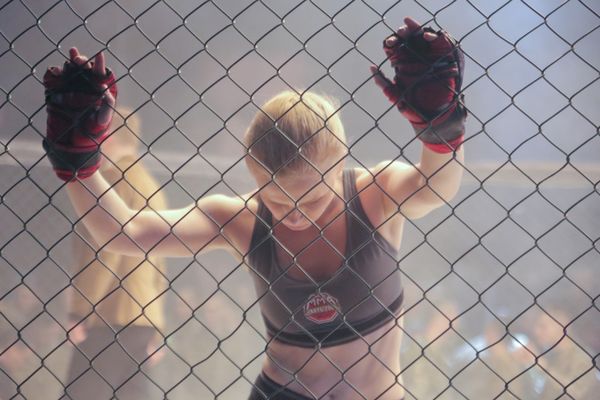Eye For Film >> Movies >> Blindfold (2020) Film Review
Blindfold
Reviewed by: Amber Wilkinson

The world of mixed martial arts and the emotional terrain of war widowhood might sound like uneasy bedfellows, but Ukranian director Taras Dron makes a virtue of the backdrop for his inventive second feature, which won the best debut award at this year's Warsaw Film Festival. Yulia (Maryna Koshkina) is on the top of her game, in the physical sense at least. An MMA champ, she is surrounded by what, at least at first, appears to be a staunch set of allies at the training club she has been a part of since she was a teenager.
Dron doesn't waste time with setting the scene, instead dropping us into the run-up to a fight, so that we learn, by degrees, that her fiance Denys is missing, presumed dead, following the war in the east of the country and that someone else is now showing an interest. Yulia may be making tentative steps to move on but Denys' mum (Larisa Rusnak), is convinced her son is out there, somewhere, and will eventually return to a hero's welcome. Dron is economical, telling us volumes about their relationship by the way Yulia gratefully accepts regular milk deliveries from the older woman before ditching it in the sink as soon as she is gone. This 'going through the motions' extends to the boxing gym. She is not just expected to act aggressively in the ring, but to maintain the 'dutiful war widow' emotions out of it, the testosterone of the male, baying crowd, a constant reminder of how she is pushed to perform - all heightened by Denys' war hero label.
As her romance with Maksym (Oleg Shulga) begins to move to a more serious level and she considers hanging up her gloves, the pressures begin to mount, not least when Denys' mum receives a dubious text message saying that her son is in hospital and demanding a hefty sum for treatment. Dron, writing with Jakub Prysak, crafts the scenes between the women well, contrasting the mix of grief and quiet desperation felt by Denys' mother, willing to believe anything that bolsters her belief that her son is a live with Yulia, who is suffering a sort of survivor's guilt as she begins to move on emotionally.
The fight scenes - used sparingly - are well-choreographed and crushingly brutal, although Dron avoids wallowing in the fight itself, instead focusing on the aggression of the crowds, particularly at an unauthorised street battle, and the bloody aftermath. There's a lot for first-time feature cinematographer Oleksandr Pozdnyakov to get his camera round, but he doesn't miss a beat. Koshkina, meanwhile, gets to the bones of Yulia, whether it's the sinuous moves of a bout or the emotional chess she is playing elsewhere. While she may be in control of her actions in the ring, everyone, it seems, wants a piece of her outside of it - whether it's Maksym insisting on a dress she feels uncomfortable in or the passive aggression of her coach (Aleksandr Mavrits).
This being a film about fighting it, of course, hinges on emotional battles as well as physical ones, but Dron spends time building his characters so that the choices they make aren't binary and feel organic.There is a distinction made between the manipulations of men - done, it seems, simply because their privilege as the 'dominant' sex allows it - and the more heartfelt coersion of Denys' mum that stems not from a desire for power but from pain. The relationship between the women is particularly well drawn as we come to see that no matter what the external conflicts, it's the grappling with inner emotions that counts.
Reviewed on: 27 Oct 2020















